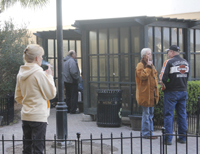|
by Susan
Johnson, Ph.D.
MUSC Employee Wellness
MUSC will
implement a tobacco-free campus
policy March 1. The policy
provides a healthy environment,
minimizes the negative effects of
passive smoke and tobacco use,
maximizes fire safety and promotes
wellness and good health habits
within all MUSC facilities. This
also includes all MUSC affiliates,
and the surrounding campus.
 The use of any
tobacco product will be prohibited
in all buildings, grounds and
spaces either leased or owned by
MUSC. Tobacco products include,
but are not limited to,
cigarettes, cigars, pipes, chewing
tobacco, e-cigarettes and other
smokeless tobacco products.
Because e-cigarettes are used by
some as a smoking cessation tool,
it is important to clarify what
e-cigarettes are and why they are
not permitted for use at MUSC. The use of any
tobacco product will be prohibited
in all buildings, grounds and
spaces either leased or owned by
MUSC. Tobacco products include,
but are not limited to,
cigarettes, cigars, pipes, chewing
tobacco, e-cigarettes and other
smokeless tobacco products.
Because e-cigarettes are used by
some as a smoking cessation tool,
it is important to clarify what
e-cigarettes are and why they are
not permitted for use at MUSC.
The smoking hut, located at the entrance to the university hospital, will be gone March 1. For information on the tobacco-free policy, visit http://academicdepartments.musc.edu/tobaccofree/.
What are electronic cigarettes?
Electronic
cigarettes, also known as
e-cigarettes, are
battery-operated products
designed to deliver nicotine,
flavor and other chemicals. They
turn nicotine, which is
addictive, and other chemicals
into a vapor that is inhaled by
the user. Most look like
cigarettes, cigars or pipes and
when used, look like the person
is smoking because when the user
exhales, there's a cloud of PEG
(propylene glycol) vapor that
looks like smoke.
Are e-cigarettes tobacco products
or drug-delivery devices?
The Food
and Drug Administration (FDA)
announced in April that it would
regulate e-cigarettes as tobacco
products, not as drug-delivery
devices. Last year, the FDA lost
a court case after it tried to
treat e-cigarettes as
drug-delivery devices, which
must satisfy stricter
requirements than tobacco
products, including clinical
trials to prove they are safe
and effective. FDA tests found
that the liquid in some
e-cigarettes contained toxins
besides nicotine, as well as
cancer-causing substances found
in tobacco.
Are e-cigarettes safe?
According
to the FDA, e-cigarettes may
contain ingredients that are
known to be toxic and may
contain other ingredients that
may not be safe. Additionally,
these products may be attractive
to young people and may lead
them to try other tobacco
products, including conventional
cigarettes, which are known to
cause disease and lead to
premature death.
Because
clinical studies about the safety
and efficacy of these products
have not been submitted to FDA,
consumers currently have no way of
knowing:
- whether
e-cigarettes are safe for their
intended use,
- what types
or concentrations of potentially
harmful chemicals are found in
these products, or
- how much
nicotine they are inhaling when
they use these products.
Are e-cigarettes recommended as a
cessation therapy?
Some
public health experts say the
level of the cancer-causing
agents is similar to those found
in nicotine replacement therapy,
which contains nicotine
extracted from tobacco. However,
both proponents and critics of
e-cigarettes agree the devices
should be studied and regulated
more and should not be sold to
minors. They may in fact be
dangerous to use, based on a
recent report by the Associated
Press of a man in Florida who
was severely injured when a
faulty battery in his
e-cigarette caused it to explode
in his mouth—
http://www.ajc.com/news/nation-world/electric-cigarette-explodes-in-1350193.html.
Why does the policy apply to the
use of e-cigarettes?
Because
the FDA classifies e-cigarettes
as tobacco products, they are
not approved for use on MUSC any
indoor or outdoor property. In
addition, because they are not
regulated by the FDA, they may
not be safe for use. If they
were actually permitted for use
on campus, because they look
very similar to real cigarettes,
it could cause confusion and an
added enforcement burden for all
those attempting to monitor
policy compliance.
For more
information on e-cigarettes,
visit http://www.who.int/mediacentre/news/releases/2008/pr34/en/
and for information on the
campus policy, visit http://academicdepartments.musc.edu/tobaccofree/.
|



 The use of any
tobacco product will be prohibited
in all buildings, grounds and
spaces either leased or owned by
MUSC. Tobacco products include,
but are not limited to,
cigarettes, cigars, pipes, chewing
tobacco, e-cigarettes and other
smokeless tobacco products.
Because e-cigarettes are used by
some as a smoking cessation tool,
it is important to clarify what
e-cigarettes are and why they are
not permitted for use at MUSC.
The use of any
tobacco product will be prohibited
in all buildings, grounds and
spaces either leased or owned by
MUSC. Tobacco products include,
but are not limited to,
cigarettes, cigars, pipes, chewing
tobacco, e-cigarettes and other
smokeless tobacco products.
Because e-cigarettes are used by
some as a smoking cessation tool,
it is important to clarify what
e-cigarettes are and why they are
not permitted for use at MUSC.